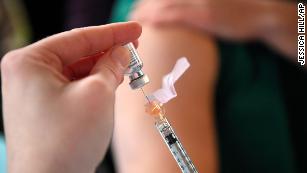First, the good news: The Moderna vaccine will likely be going into people’s arms Monday, boosting the number of Americans who will start getting inoculated against Covid-19.
Now, the bad news: Most Americans can’t get vaccinated until next year. In the meantime, new infections, hospitalizations and deaths keep soaring, prompting health experts to urge the public to stay home this Christmas week.
“This is really not the time to be traveling,” epidemiologist Dr. Celine Gounder said.
But millions of airline passengers ignored such advice and traveled over the weekend.
Now travelers risk getting infected with a new variant of coronavirus that may be even more contagious.
What we know about the new variant
A variant of the virus is spreading rapidly in the UK, prompting dozens of new travel bans and raising concerns about what this means for the world.
England’s Chief Medical Officer Chris Whitty warned Saturday that the new variant “can spread more quickly” and was responsible for 60% of new infections in London.
So far, there’s no evidence to suggest the new variant is more lethal, or that current vaccines wouldn’t work against it, Whitty said.
But a virus that spreads more easily could result in more infections, which in turn might lead to more hospitalizations and deaths.
Backward tracing using genetic evidence suggests the new UK variant emerged in September and then circulated at very low levels in the population until mid-November, according to Public Health England.
At least 24 countries are now banning passenger travel from the UK, including Canada, Russia, France, Chile, Italy, Iran and Sweden.
As of Monday morning, there are no plans to enact a US travel ban against the UK, US Assistant Secretary for Health Adm. Brett Giroir said.
Gounder said a new travel ban might not do much good now. “We have seen this virus circulating within the UK for at least a few months now,” Gounder said.
“Because this virus has been circulating for some period of time in the UK already, the cat’s out of the bag. It has spread elsewhere, including the United States.”
Travel bans can also backfire, Gounder said.
“As we saw when there were efforts to ban travel from China before, people rushed to travel. So the likelihood (is) that that could backfire — that people will actually travel more, all of a sudden, in advance of impending bans.”
A new timeline for vaccinations
More than 556,000 people — largely health care workers and nursing home residents — have received their first doses of the Pfizer-BioNTech vaccine.
Now the first public doses of the Moderna vaccine are expected to be given Monday, Operation Warp Speed chief Moncef Slaoui said.
Recipients of the Moderna vaccine should get their second dose 28 days after their first dose. Those who get the Pfizer-BioNTech vaccine should get their second dose 28 days later.
Although enough vaccinations for 20 million people will be produced by the end of the year, it “may bleed into the first week (of January) to get those distributed and vaccinated,” Giroir said Monday.
Will the vaccines work against the new variant?
Both the Pfizer/BioNTech vaccine and the Moderna vaccine have shown efficacy rates of around 95% in clinical trials. But many are questioning whether the vaccines would work on new variants of the virus — like one that is spreading in the UK.
“Up to now, I don’t think there has been a single variant that would be resistant to the vaccine,” Slaoui sad. “We can’t exclude it, but it’s not there now.”
He said the novel coronavirus may be prone to variance. But critical aspects of the virus, such as the spike protein involved in a vaccine, are very specific to the novel coronavirus and unlikely to mutate much.
Giroir also said he thinks the current vaccines will work against the variant.
“Remember, our vaccines develop antibodies against multiple parts of that spike protein — not just one that’s the mutated one,” he said.
Scientists at the Walter Reed Army Institute of Research are examining the variant and expect to know in the next few days if they think vaccines might not work against it.
But most Americans can’t get vaccinated for months.
“So I think what we really need to be doing is focusing on the things we know will prevent spread of this new variant — which is the same thing that works against spread of the coronavirus in general,” Gounder said.
“That is masks, social distancing. If you’re going to be around other people, do it outdoors. And with the holidays coming up, this is really not the time to be traveling.”
No more ICU capacity
In Los Angeles County, an estimated one in every 64 residents is infected with coronavirus and “actively infecting others,” county health services director Christina Ghaly said Monday.
The county’s hospitals are now full. About half of all ICU patients are suffering from Covid-19. And about a third of regular hospital beds are filled with coronavirus patients, Ghaly said.
ICU capacity in Southern California and in the San Joaquin Valley remain at zero, with just 2.1% of ICU beds available statewide.
Guidelines on how Los Angeles County hospitals could prioritize patients by rationing care have been circulated among doctors at some area hospitals, the Los Angeles Times reported. Without enough staff to save every patient, doctors may soon be faced with just trying to save as many as possible.
“It’s heartbreaking, really, to see where we’re at,” Ghaly said.
By Madeline Holcombe and Holly Yan


